八年级英语语法不定代词专题讲解及练习
- 格式:pdf
- 大小:168.64 KB
- 文档页数:7
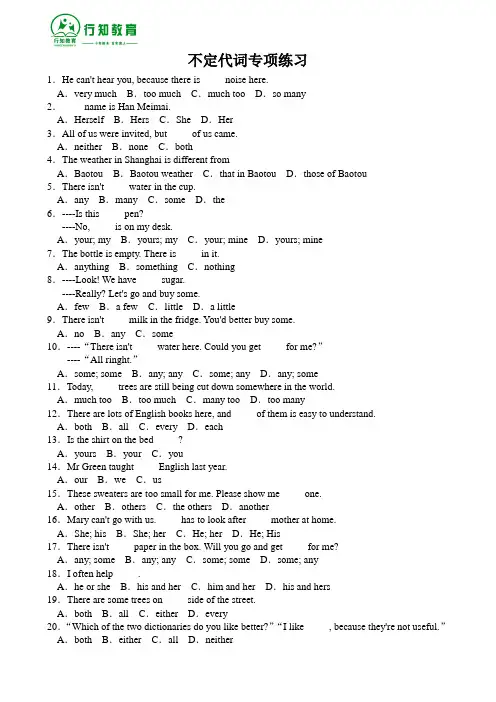
不定代词专项练习1.He can't hear you, because there is ____ noise here.A.very much B.too much C.much too D.so many2.____ name is Han Meimai.A.Herself B.Hers C.She D.Her3.All of us were invited, but ____ of us came.A.neither B.none C.both4.The weather in Shanghai is different from ____A.Baotou B.Baotou weather C.that in Baotou D.those of Baotou5.There isn't ____ water in the cup.A.any B.many C.some D.the6.----Is this ____ pen?----No, ____ is on my desk.A.your; my B.yours; my C.your; mine D.yours; mine7.The bottle is empty. There is ____ in it.A.anything B.something C.nothing8.----Look! We have ____ sugar.----Really? Let's go and buy some.A.few B.a few C.little D.a little9.There isn't ____ milk in the fridge. You'd better buy some.A.no B.any C.some10.----“There isn't ____ water here. Could you get ____ for me?”----“All ringht.”A.some; some B.any; any C.some; any D.any; some11.Today, ____ trees are still being cut down somewhere in the world.A.much too B.too much C.many too D.too many12.There are lots of English books here, and ____ of them is easy to understand.A.both B.all C.every D.each13.Is the shirt on the bed ____ ?A.yours B.your C.you14.Mr Green taught ____ English last year.A.our B.we C.us15.These sweaters are too small for me. Please show me ____ one.A.other B.others C.the others D.another16.Mary can't go with us. ____ has to look after ____ mother at home.A.She; his B.She; her C.He; her D.He; His17.There isn't ____ paper in the box. Will you go and get ____ for me?A.any; some B.any; any C.some; some D.some; any18.I often help ____ .A.he or she B.his and her C.him and her D.his and hers19.There are some trees on ____ side of the street.A.both B.all C.either D.every20.“Which of the two dictionaries do you like better?”“I like ____ , because they're not useful.”A.both B.either C.all D.neither21.They were all very tired, but ____ of them would stop to take a rest.A.any B.some C.None D.neither22.There were ____ people and noise in the park last Sunday.A.many; much B.much; muchC.much; many D.many; many23.____ of them has a dictionary and ____ one of them can look up words in the dictionary.A.Each; every B.Every; eachC.Each; each D.Every; every24.Please keep together. We want ____ of you to get lost.A.none B.some C.many D.any25.There is ____ water here; but there are quite ____ empty glasses.A.little; a few B.few; little C.few; a few D.little; a little26.The skirt is ____ . She made it ____ .A.hers; herself B.her; herself C.herself; hers D.herself; her27.“Haven't you forgotten ____ ?”“____ ,oh, I forgot my bag.”A.anything; Excuse me B.something; Excuse meC.something; Pardon D.everything; Pardon28.Be quiet! I have ____ to tell you.A.important anything B.anything importantC.important something D.something important29.My father is very busy with his work. He has ____ time to do the housework.A.Little B.Few C.a little D.a few30.____ of the boys in Class Four are playing games.A.All B.Each C.The both D.None31.The boy promised ____ mother never to lie to ____ again.A.his; him B.her; her C.her; him D.his; her32.“Would you like some milk in your tea?”“Yes, just ____ .”A.much B.a little C.a few D.little33.____ school is much larger than ____ .A.Their; our B.Their; ours C.Theirs; ours D.Theirs; our34.Put it down, Richard. You mustn't read ____ letter.A.anyone's else's B.anyone's else C.anyone else's D.anyone else 35.He found ____ very interesting to ride a horse.A.this B.that C.It D.which36.Han Meimei, what about ____ to eat?A.everything B.something C.Nothing D.anything37.____ office is much smaller than ____ .A.Ours; yours B.Our; yours C.Theirs; our D.Your; their38.“Help ____ to some meat, Mary,”my aunt said to me.A.themselves B.Ourselves C.yourself D.himself39.There are twenty teachers in this grade.Eight of them are women teachers and ____ are men teachers.A.the other B.the others C.Others D.other40.Though they had cleaned the floor, there was still ____ water on it.A.little B.a little C.few D.a few不定代词专项练习参考答案1.B.too much只能修饰不可数名词, much too 修饰形容词或副词, very much可修饰动词;many 只能修饰可数名词,不能修饰不可数名词。

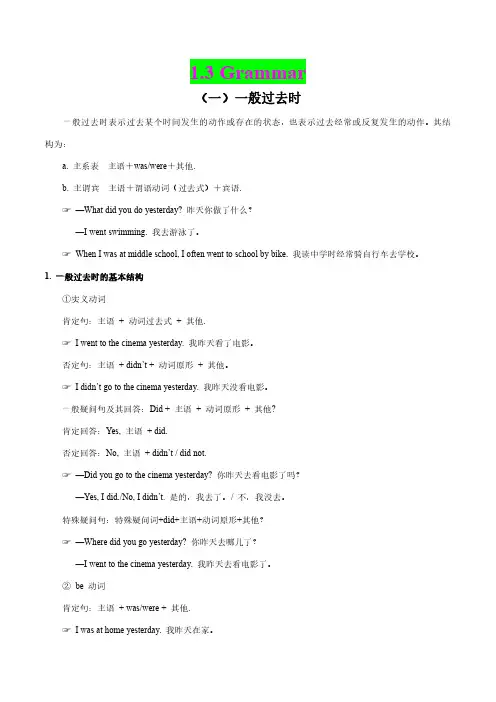
1.3Grammar(一)一般过去时一般过去时表示过去某个时间发生的动作或存在的状态,也表示过去经常或反复发生的动作。
其结构为:a.主系表主语+was/were+其他.b.主谓宾主语+谓语动词(过去式)+宾语.☞—What did you do yesterday?昨天你做了什么?—I went swimming.我去游泳了。
☞When I was at middle school,I often went to school by bike.我读中学时经常骑自行车去学校。
1.一般过去时的基本结构①实义动词肯定句:主语+动词过去式+其他.☞I went to the cinema yesterday.我昨天看了电影。
否定句:主语+didn’t+动词原形+其他。
☞I didn’t go to the cinema yesterday.我昨天没看电影。
一般疑问句及其回答:Did+主语+动词原形+其他?肯定回答:Yes,主语+did.否定回答:No,主语+didn’t/did not.☞—Did you go to the cinema yesterday?你昨天去看电影了吗?—Yes,I did./No,I didn’t.是的,我去了。
/不,我没去。
特殊疑问句:特殊疑问词+did+主语+动词原形+其他?☞—Where did you go yesterday?你昨天去哪儿了?—I went to the cinema yesterday.我昨天去看电影了。
②be动词肯定句:主语+was/were+其他.☞I was at home yesterday.我昨天在家。
否定句:主语+wasn’t/weren’t+其他.☞I wasn’t at home yesterday.我昨天没在家。
一般疑问句及其回答:Were/Was+主语+其他?☞—Were you at home yesterday?你昨天在家吗?—Yes,I was./No,I wasn’t.是的,我在家。
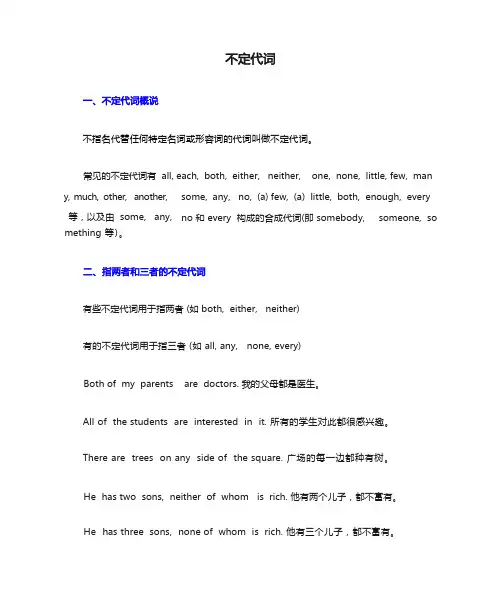
不指名代替任何特定名词或形容词的代词叫做不定代词。
常见的不定代词有 all, each, both, either, neither, one, none, little, few, many, much, other, another,等,以及由 some, any, mething 等)。
some, any, no, (a) few, (a) little, both, enough, every no 和 every 构成的合成代词(即 somebody, someone, so有些不定代词用于指两者 (如 both, either, neither)有的不定代词用于指三者 (如 all, any, none, every)Both of my parents are doctors. 我的父母都是医生。
All of the students are interested in it. 所有的学生对此都很感兴趣。
There are trees on any side of the square. 广场的每一边都种有树。
He has two sons, neither of whom is rich. 他有两个儿子,都不富有。
He has three sons, none of whom is rich. 他有三个儿子,都不富有。
each 可用于两者、三者或三者以上,而 every 只用于三者或三者以上,因此用于两者时只能用 each ,不能用 every 。
如:不能说 There are trees on every side of the road.复合不定代词包括 something, somebody, someone, anything, anybody, any one, nothing, nobody, no one, everything, everybody, everyone 等。
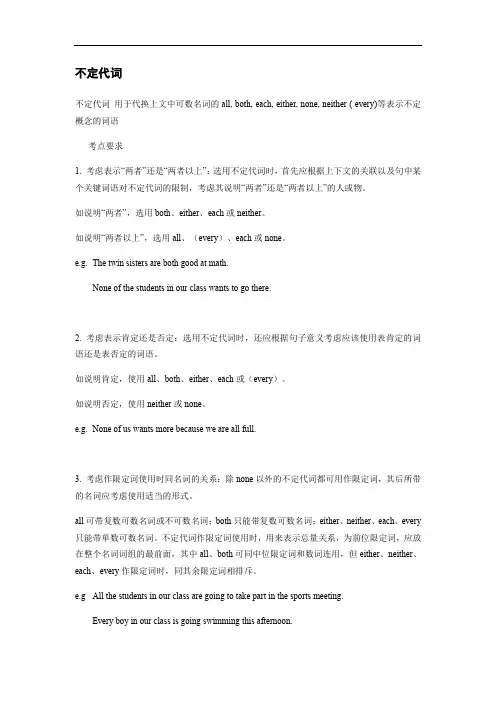
不定代词不定代词用于代换上文中可数名词的all, both, each, either, none, neither ( every)等表示不定概念的词语考点要求1. 考虑表示“两者”还是“两者以上”:选用不定代词时,首先应根据上下文的关联以及句中某个关键词语对不定代词的限制,考虑其说明“两者”还是“两者以上”的人或物。
如说明“两者”,选用both、either、each或neither。
如说明“两者以上”,选用all、(every)、each或none。
e.g.The twin sisters are both good at math.None of the students in our class wants to go there.2. 考虑表示肯定还是否定:选用不定代词时,还应根据句子意义考虑应该使用表肯定的词语还是表否定的词语。
如说明肯定,使用all、both、either、each或(every)。
如说明否定,使用neither或none。
e.g.None of us wants more because we are all full.3. 考虑作限定词使用时同名词的关系:除none以外的不定代词都可用作限定词,其后所带的名词应考虑使用适当的形式。
all可带复数可数名词或不可数名词;both只能带复数可数名词;either、neither、each、every 只能带单数可数名词。
不定代词作限定词使用时,用来表示总量关系,为前位限定词,应放在整个名词词组的最前面,其中all、both可同中位限定词和数词连用,但either、neither、each、every作限定词时,同其余限定词相排斥。
e.g All the students in our class are going to take part in the sports meeting.Every boy in our class is going swimming this afternoon.4. 考虑作主语时主谓一致性关系:不定代词作主语时,应考虑其说明单数还是复数,以便确定谓语动词是否应使用第三人称单数形式(-s形式)以及be动词使用单数还是复数。
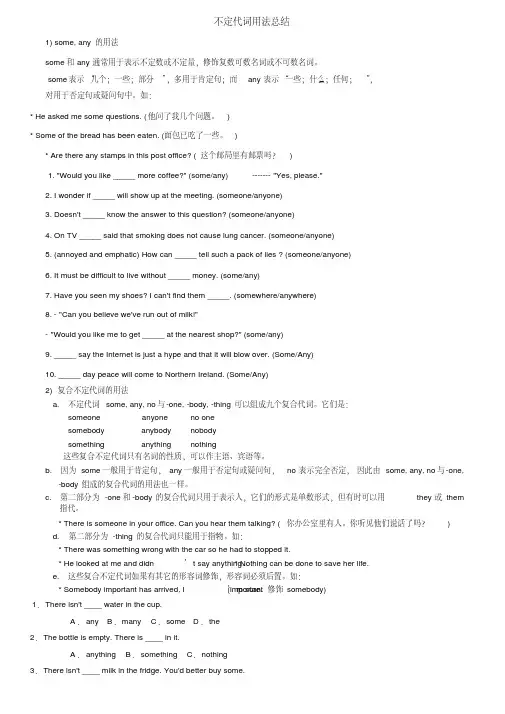
不定代词用法总结1) some, any的用法some和any通常用于表示不定数或不定量,修饰复数可数名词或不可数名词。
some表示“几个;一些;部分”,多用于肯定句;而any表示“一些;什么;任何;”,对用于否定句或疑问句中。
如:* He asked me some questions. (他问了我几个问题。
)* Some of the bread has been eaten. (面包已吃了一些。
)* Are there any stamps in this post office? (这个邮局里有邮票吗?)1. "Would you like _____ more coffee?" (some/any) -------"Yes, please."2. I wonder if _____ will show up at the meeting. (someone/anyone)3. Doesn't _____ know the answer to this question? (someone/anyone)4. On TV _____ said that smoking does not cause lung cancer. (someone/anyone)5. (annoyed and emphatic) How can _____ tell such a pack of lies ? (someone/anyone)6. It must be difficult to live without _____ money. (some/any)7. Have you seen my shoes? I can't find them _____. (somewhere/anywhere)8. - "Can you believe we've run out of milk!"- "Would you like me to get _____ at the nearest shop?" (some/any)9. _____ say the Internet is just a hype and that it will blow over. (Some/Any)10. _____ day peace will come to Northern Ireland. (Some/Any)2) 复合不定代词的用法a. 不定代词some, any, no与-one, -body, -thing可以组成九个复合代词。
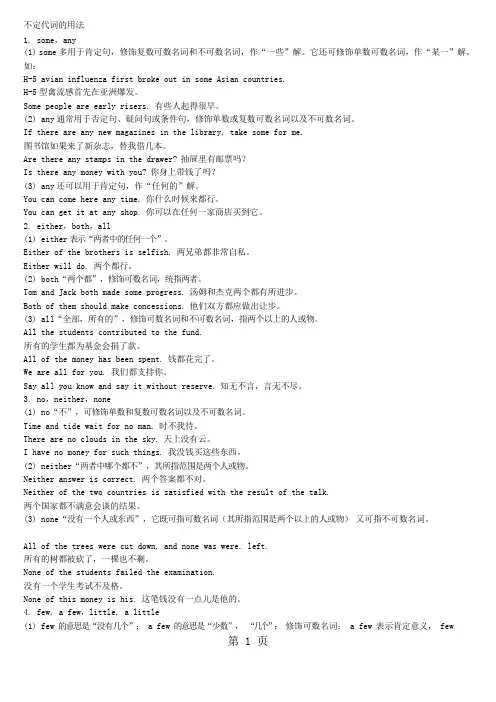
不定代词的用法1.some,any(1)some多用于肯定句,修饰复数可数名词和不可数名词,作“一些”解。
它还可修饰单数可数名词,作“某一”解。
如:H-5avian influenza first broke out in some Asian countries.H-5型禽流感首先在亚洲爆发。
Some people are early risers.有些人起得很早。
(2)any通常用于否定句、疑问句或条件句,修饰单数或复数可数名词以及不可数名词。
If there are any new magazines in the library,take some for me.图书馆如果来了新杂志,替我借几本。
Are there any stamps in the drawer?抽屉里有邮票吗?Is there any money with you?你身上带钱了吗?(3)any还可以用于肯定句,作“任何的”解。
You can come here any time.你什么时候来都行。
You can get it at any shop.你可以在任何一家商店买到它。
2.either,both,all(1)either表示“两者中的任何一个”。
Either of the brothers is selfish.两兄弟都非常自私。
Either will do.两个都行。
(2)both“两个都”,修饰可数名词,统指两者。
Tom and Jack both made some progress.汤姆和杰克两个都有所进步。
Both of them should make concessions.他们双方都应做出让步。
(3)all“全部,所有的”,修饰可数名词和不可数名词,指两个以上的人或物。
All the students contributed to the fund.所有的学生都为基金会捐了款。
All of the money has been spent.钱都花完了。
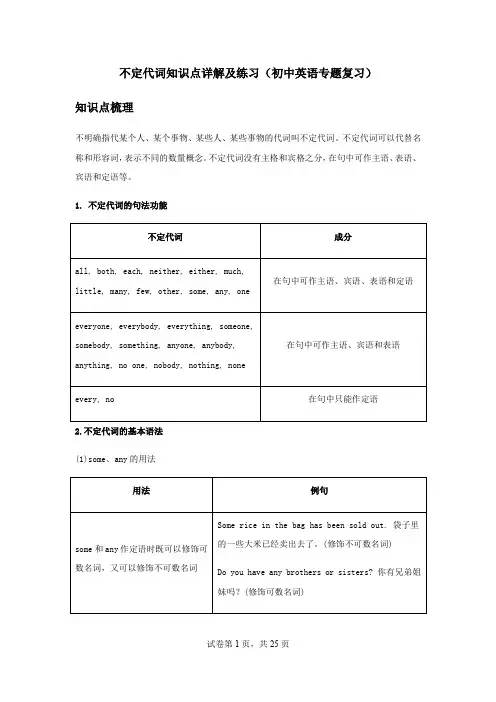
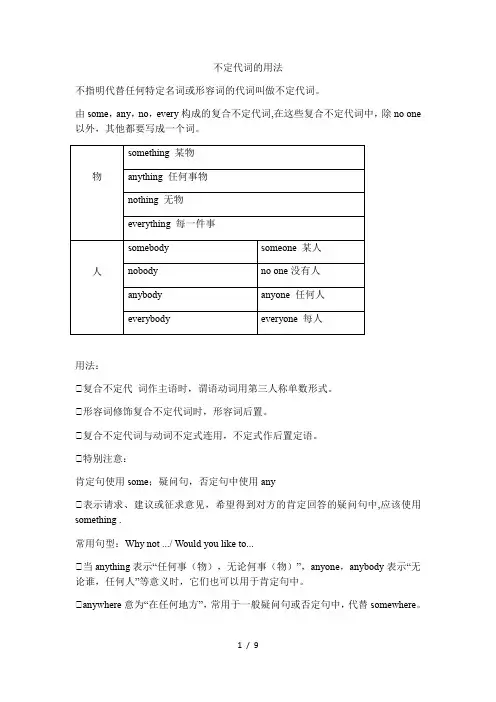
不定代词的用法不指明代替任何特定名词或形容词的代词叫做不定代词。
由some,any,no,every构成的复合不定代词,在这些复合不定代词中,除no one 以外,其他都要写成一个词。
用法:①复合不定代词作主语时,谓语动词用第三人称单数形式。
①形容词修饰复合不定代词时,形容词后置。
①复合不定代词与动词不定式连用,不定式作后置定语。
①特别注意:肯定句使用some;疑问句,否定句中使用any①表示请求、建议或征求意见,希望得到对方的肯定回答的疑问句中,应该使用something .常用句型:Why not .../ Would you like to...①当anything表示“任何事(物),无论何事(物)”,anyone,anybody表示“无论谁,任何人”等意义时,它们也可以用于肯定句中。
①anywhere意为“在任何地方”,常用于一般疑问句或否定句中,代替somewhere。
练习题一、单项选择题( ) 1. I’m hungry. I want ______ to eat.A. anythingB. somethingC. everythingD. nothing( ) 2. —Do you have ______ to say for yourself?—No, I have ______ to say.A. something; everythingB. nothing; somethingC. everything; anythingD. anything; nothing( ) 3. Why not ask ______ to help you?A. everyoneB. someoneC. anyoneD. none( ) 4. Everything ______ ready. We can start now.A. areB. isC. beD. were( ) 5. There’s ______ with his eyes. He’s OK.A. anything wrongB. wrong somethingC. nothing wrongD. wrong nothing( ) 6. —The story is so amazing! It’s the most interesting story I’ve ever read.—But I’m afraid it won’t be liked by _____.A. everybodyB. somebodyC. anybodyD. nobody( ) 7. She listened carefully, but heard ______.A. anyoneB. someoneC. everyoneD. nothing( )8.I don’t like this coat,could you please show me ______?A. otherB. anotherC. the otherD. others( ) 9.There are many people in the park,some are playing cards,some are dancing,and ____are taking a walk in it.A. other peoplesB. the othersC. othersD. the other people( ) 10.I have two uncles,one is a doctor and _____ is a teacher.A. the otherB. anotherC. otherD. another one( ) 11.Some students hope to enter the best universities while _____ simply wants to learn skills.A. the othersB. othersC. anotherD. the other( ) 12.“Do you like these pants sir?” “No,please show me ______.”A. anotherB. some onesC. some othersD. the other( ) 13.I have two TV set,but _____ of them is in good condition.A. bothB. noneC. neitherD. every( ) 14.Walking along the streets,you can see many beautiful flowers on _____ side of the street.A. everyB. allC. bothD. either( )15._____ of my parents is poor-educated,they both left school when they were 13.A. BothB. AllC. EitherD. Neither( ) 16._____of us answered the phone,for we were all in the yard.A. EitherB. NeitherC. AllD. None( ) 17.——How many monkeys are there in the cage left?—— _____.A. NoneB. No oneC. NothingD. not some( )18.Some students hope to enter the best universities while _____ simply want to learn skills.A. the othersB. othersC. anotherD. the other( ) 19.I invited Joe and Linda to dinner,but _____of them came.A. neitherB. eitherC. noneD. both( ) 20.I had to buy ____these books because I didn‘t know which one was the best.A. bothB. noneC. neitherD. all( ) 21.I have done much of the work. Could you please finish ____in two days?A. the rest B. the other C. another D. the others( ) 22.Both teams were in hard training;_____was willing to lose the game.A.eitherB. neitherC. anotherD. the other( ) 23.The bottle is empty. There is ____ in it.A.anything B.something C.nothing( ) 24.----Look! We have ____ sugar.----Really? Let's go and buy some.A.few B.a few C.little D.a little( ) 25.There isn't ____ milk in the fridge. You'd better buy some.A.no B.any C.some( ) 26.----“There isn't ____ water here. Could you get ____ for me?”----“All right.”A.some; some B.any; any C.some; any D.any; some( ) 27.Today, ____ trees are still being cut down somewhere in the world.A.much too B.too much C.many too D.too many( )28.There are lots of English books here, and ____ of them is easy to understand. both B.all C.every D.Each( )29.These sweaters are too small for me. Please show me ____ one.A.other B.others C.the others D.another( )30.There isn't ____ paper in the box. Will you go and get ____ for me?A.any; some B.any; any C.some; some D.some; any二、选词填空some, any, something, someone, somebody, somewhere, anything, anyone, anybody, anywhere, no one, nobody, nothing1.Do you have ____questions?2.Maybe ____put my dictionary ____.I can't find it ____.3.I'm so thirsty.Shall we get ____to drink?4.I don't think ____knows her new address.5.There's ____in the new cupboard.It's empty now.6.____is too difficult if you put your heart into it.7.I think you can find him ____in the school.8.____can run faster than he. He's the winner.9. Could you tell ____different between the two pictures ?10.Please help yourself to ____soup.参考答案一、单项选择题( ) 1. I’m hungry. I want ______ to eat.A. anythingB. somethingC. everythingD. nothing( ) 2. —Do you have ______ to say for yourself?—No, I have ______ to say.A. something; everythingB. nothing; somethingC. everything; anythingD. anything; nothing( ) 3. Why not ask ______ to help you?A. everyoneB. someoneC. anyoneD. none( ) 4. Everything ______ ready. We can start now.A. areB. isC. beD. were( ) 5. There’s ______ with his eyes. He’s OK.A. anything wrongB. wrong somethingC. nothing wrongD. wrong nothing( ) 6. —The story is so amazing! It’s the most interesting story I’ve ever read.—But I’m afraid it won’t be liked by _____.A. everybodyB. somebodyC. anybodyD. nobody( ) 7. She listened carefully, but heard ______.A. anyoneB. someoneC. everyoneD. nothing( )8.I don’t like this coat,could you please show me ______?A. otherB. anotherC. the otherD. others( ) 9.There are many people in the park,some are playing cards,some are dancing,and ____are taking a walk in it.A. other peoplesB. the othersC. othersD. the other people( ) 10.I have two uncles,one is a doctor and _____ is a teacher.A. the otherB. anotherC. otherD. another one( ) 11.Some students hope to enter the best universities while _____ simply wants to learn skills.A. the othersB. othersC. anotherD. the other( ) 12.“Do you like these pants sir?” “No,please show me ______.”A. anotherB. some onesC. some othersD. the other( ) 13.I have two TV set,but _____ of them is in good condition.A. bothB. noneC. neitherD. every( ) 14.Walking along the streets,you can see many beautiful flowers on _____ side of the street.A. everyB. allC. bothD. either( )15._____ of my parents is poor-educated,they both left school when they were 13.A. BothB. AllC. EitherD. Neither( ) 16._____of us answered the phone,for we were all in the yard.A. EitherB. NeitherC. AllD. None( ) 17.——How many monkeys are there in the cage left?—— _____.A. NoneB. No oneC. NothingD. not some( )18.Some students hope to enter the best universities while _____ simply want to learn skills.A. the othersB. othersC. anotherD. the other( ) 19.I invited Joe and Linda to dinner,but _____of them came. A. neither B. either C. none D. both( ) 20.I had to buy ____these books because I didn‘t know which one was the best.A. bothB. noneC. neitherD. all( ) 21.I have done much of the work. Could you please finish ____in two days?A. the restB. the otherC. anotherD. the others( ) 22.Both teams were in hard training;_____was willing to lose the game.A.eitherB. neitherC. anotherD. the other( ) 23.The bottle is empty. There is ____ in it.A.anything B.something C.nothing( ) 24.----Look! We have ____ sugar.----Really? Let's go and buy some.A.few B.a few C.little D.a little( ) 25.There isn't ____ milk in the fridge. You'd better buy some.A.no B.any C.some( ) 26.----“There isn't ____ water here. Could you get ____ for me?”----“All right.”A.some; some B.any; any C.some; any D.any; some( ) 27.Today, ____ trees are still being cut down somewhere in the world.A.much too B.too much C.many too D.too many( )28.There are lots of English books here, and ____ of them is easy to understand.A.both B.all C.every D.each( )29.These sweaters are too small for me. Please show me ____ one.A.other B.others C.the others D.another( )30.There isn't ____ paper in the box. Will you go and get ____ for me?A.any; some B.any; any C.some; some D.some; any三、选词填空some, any, something, someone, somebody, somewhere, anything, anyone, anybody, anywhere, no one, nobody, nothing1.Do you have ____questions?2.Maybe ____put my dictionary ____.I can't find it ____.3.I'm so thirsty.Shall we get ____to drink?4.I don't think ____knows her new address.5.There's ____in the new cupboard.It's empty now.6.____is too difficult if you put your heart into it.7.I think you can find him ____in the school.8.____can run faster than he. He's the winner.9. Could you tell ____different between the two pictures ?10.Please help yourself to ____soup.参考答案:1.any2.someone /somebody somewhere anywhere 3.something4.no one /nobody5.nothing6.Nothing7.somewhere8.No one /Nobody9.something10. some。
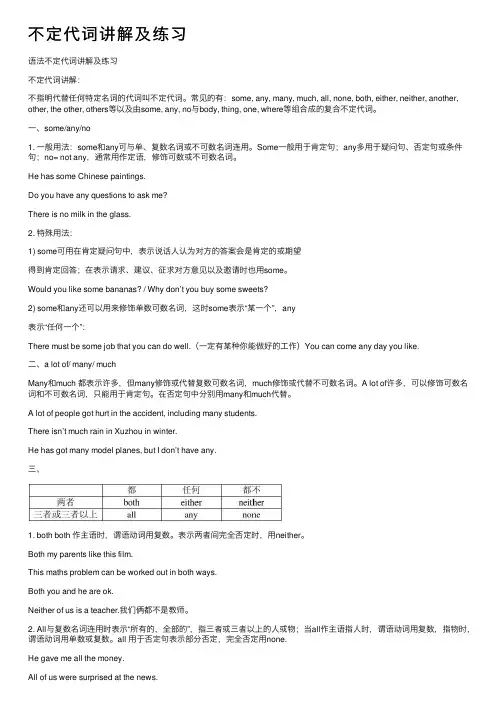
不定代词讲解及练习语法不定代词讲解及练习不定代词讲解:不指明代替任何特定名词的代词叫不定代词。
常见的有:some, any, many, much, all, none, both, either, neither, another, other, the other, others等以及由some, any, no与body, thing, one, where等组合成的复合不定代词。
⼀、some/any/no1. ⼀般⽤法:some和any可与单、复数名词或不可数名词连⽤。
Some⼀般⽤于肯定句;any多⽤于疑问句、否定句或条件句;no= not any,通常⽤作定语,修饰可数或不可数名词。
He has some Chinese paintings.Do you have any questions to ask me?There is no milk in the glass.2. 特殊⽤法:1) some可⽤在肯定疑问句中,表⽰说话⼈认为对⽅的答案会是肯定的或期望得到肯定回答;在表⽰请求、建议、征求对⽅意见以及邀请时也⽤some。
Would you like some bananas? / Why don’t you buy some sweets?2) some和any还可以⽤来修饰单数可数名词,这时some表⽰“某⼀个”,any表⽰“任何⼀个”:There must be some job that you can do well.(⼀定有某种你能做好的⼯作)You can come any day you like.⼆、a lot of/ many/ muchMany和much 都表⽰许多,但many修饰或代替复数可数名词,much修饰或代替不可数名词。
A lot of许多,可以修饰可数名词和不可数名词,只能⽤于肯定句。
在否定句中分别⽤many和much代替。
A lot of people got hurt in the accident, including many students.There isn’t much rain in Xuzhou in winter.He has got many model planes, but I don’t have any.三、1. both both 作主语时,谓语动词⽤复数。
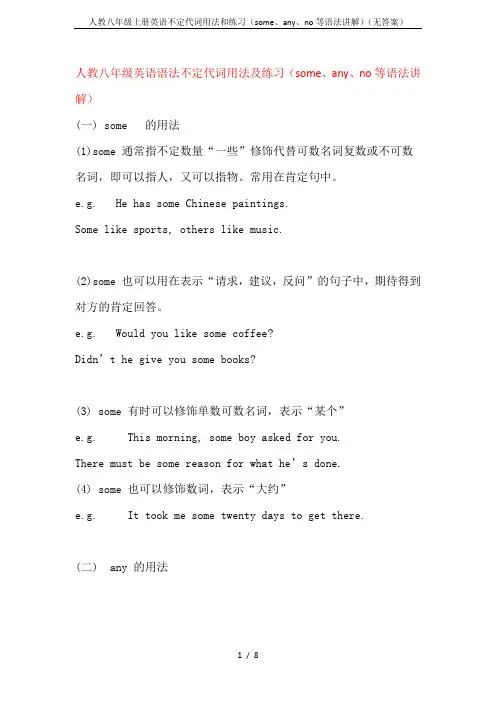
人教八年级英语语法不定代词用法及练习(some、any、no等语法讲解)(一) some 的用法(1)some 通常指不定数量“一些”修饰代替可数名词复数或不可数名词,即可以指人,又可以指物。
常用在肯定句中。
e.g. He has some Chinese paintings.Some like sports, others like music.(2)some 也可以用在表示“请求,建议,反问”的句子中,期待得到对方的肯定回答。
e.g. Would you like some coffee?Didn’t he give you some books?(3) some 有时可以修饰单数可数名词,表示“某个”e.g. This morning, some boy asked for you.There must be some reason for what he’s done.(4) some 也可以修饰数词,表示“大约”e.g. It took me some twenty days to get there.(二) any 的用法(1)不定代词any和some一样表示不定数量“一些”,修饰和代替可数名词复数和不可数名词,既可指人又可指物。
但一般用在否定句、疑问句,条件从句中。
e.g. Ask me if you have any questions?Do you have any questions to ask?I don't know any of the students.Do you have any questions? If you have any, don' t hesitate to ask me.There isn't any tea left. I'll go and make some for you.(2)用于肯定句中,表示“任何—个”,修饰单数可数名词和不可数名词。
不定代词不定代词用于代换上文中可数名词的all, both, each, either, none, neither ( every)等表示不定概念的词语考点要求1. 考虑表示“两者”还是“两者以上”:选用不定代词时,首先应根据上下文的关联以及句中某个关键词语对不定代词的限制,考虑其说明“两者”还是“两者以上”的人或物。
如说明“两者”,选用both、either、each或neither。
如说明“两者以上”,选用all、(every)、each或none。
e.g.The twin sisters are both good at math.None of the students in our class wants to go there.2. 考虑表示肯定还是否定:选用不定代词时,还应根据句子意义考虑应该使用表肯定的词语还是表否定的词语。
如说明肯定,使用all、both、either、each或(every)。
如说明否定,使用neither或none。
e.g.None of us wants more because we are all full.3. 考虑作限定词使用时同名词的关系:除none以外的不定代词都可用作限定词,其后所带的名词应考虑使用适当的形式。
all可带复数可数名词或不可数名词;both只能带复数可数名词;either、neither、each、every 只能带单数可数名词。
不定代词作限定词使用时,用来表示总量关系,为前位限定词,应放在整个名词词组的最前面,其中all、both可同中位限定词和数词连用,但either、neither、each、every作限定词时,同其余限定词相排斥。
e.g All the students in our class are going to take part in the sports meeting.Every boy in our class is going swimming this afternoon.4. 考虑作主语时主谓一致性关系:不定代词作主语时,应考虑其说明单数还是复数,以便确定谓语动词是否应使用第三人称单数形式(-s形式)以及be动词使用单数还是复数。
英语语法---不定代词讲与练一、不定代词的用法1、定义:不定代词是不指明代替任何特定名词或形容词的代词。
2、分类:英语中不定代词有:some(something,somebody,someone,somewhere),any(anything,anybody,anyone,anywhere),no(nothing,nobody,no one),every(everything,everybody,everyone,everywhere),all,each,both,much,many,(a)little,(a)few,other(s),another,none,one,either,neither等。
3、不定代词的句法功能1)作主语,例:Both(of us)are right.Neither(of the answers)is correct.2)作宾语,例:There is room for all of us.If you have any,give us some.3)作表语,例:Is that all you want to know?I’m not somebody,I’m nobody.我不是重要人物,我是个无名小卒.4)作定语,例:You may take either road.Everybody‘s business is nobody’s business.人人都管等于没人管。
(谚)5)作同位语,例:They both agreed to stay here.We none of us said anything.4、需要注意的问题(☆不定代词是英语所有代词中最重要的一类,也是高考英语中最常考的一类,复习时应注意以下几点):1)some和any的比较不定代词some,any都是“一些”的意思,都可和可数名词或不可数名词连用。
some一般用于肯定句中;而any则用于否定句、疑问句或条件从句中.例:Tom has some picture-books.I have waited some time.Have you any questions?There aren’t any pictures on the w all.注意:在表示请求、邀请或征求意见的句子中,通常要用some 而不用any。
最新版初中英语语法词类用法系列(一)————不定代词的讲解及练习(有答案)不定代词的用法讲解1.some,any(1) some “一些”,多用于肯定句,修饰复数可数名词和不可数名词;用在疑问句,表示说话人有肯定的意思。
例:Some people are early risers. 有些人起得很早。
Would you like some tea? 您喝茶吗?some “某一”,修饰单数可数名词。
例:Some man called this morning.今早上有人打电话。
(2) a ny“一些”通常用于否定句、疑问句或条件句,修饰复数可数名词或不可数名词。
例:If there are any new magazines in the library, take some for me. 图书馆如果来了新杂志,替我借几本。
Is there any money with you? 你身上带钱了吗?Few, if any, will survive there. 只有很少的人会在那里幸存,如果可能的话。
any “任何的” 用于肯定句,修饰单、复数可数名词或不可数名词。
例:You can come here any time. 你什么时候来都行。
You can get it at any shop. 你可以在任何一家商店买到它。
2. either,both,all(1) either表示“两者中的任何一个”。
既可指人也可指物。
表肯定意义,可单独使用,也可与of连用,在句中作主语、宾语、定语等,用作单数。
例:Either of the brothers is selfish. 两兄弟都非常自私。
Either will do. 两个都行。
(2) both“两个都”,既指人也指物,表肯定意义,如与not连用则表示部分否定,修饰可数名词,在句中作主宾语、表语、定语等,也可单独使用,用作复数,统指两者。
例:Tom and Jack both made some progress. 汤姆和杰克两个都有所进步。
不定代词讲解与习题 .之迟辟智美创作不定代词讲解与习题 .不定代词用法注意点:1. one, some与any:1) one可以泛指任何人,也可特指,复数为ones.a. one作为代词可以指人,也可以指物.b. one,ones (one的复数形式) 可用来取代前面呈现过的少数名词,以防止重复.c. one的前面可用this,that,the,which等词来修饰.d. 常有a+形容词+one这一形式.it和one的用法区别:it用来指特定的工具,而one则用于替代不特定的工具some多用于肯定句,any多用于疑问句和否定句.One should learn to think of others.Have you any bookmarks? no, i don’t have any bookmarks.I have some questions to ask.2) some可用于疑问句中,暗示盼望获得肯定的回答,或者暗示建议,请求等.would you like some bananas? could you give me some money?3) some 和any修饰可数名词双数时,some暗示某个,any暗示任何一个.i have read this article in some magazine. please correct the mistakes, if a ny.4) some和数词连用暗示“年夜约”,any可与比力级连用暗示水平. there are some 3,000 students in this school. do you feel any better today?2. each和every:a. each用来指两个或两个以上的人或物中的一个.every则指两个以上的人或物中的一个.b. 从含义和语法功能上看,each是“单个”的意思,偏重个体,在句中可作主语、同位语、定语和宾语.而every是“每一个”之意,偏重全体、整体、共性.在句中只能作定语,也就是说它后面必需跟着名词.而由every 构成的合成词后面绝不能跟名词.each强调个别,代表的数可以是两个或两个以上,而every强调整体,所指的数必需是三个或三个以上.each student has a pocket dictionary. / each (of us) has a dictionary. / we eac h have a dictionary.every student has strong and weak points. / every one of us has strong and weak points.3. none和no:no即是not any,作定语.none作主语或宾语,取代不成数名词,谓语用双数,取代可数名词,谓语单复数皆可以.there is no water in the bottle.how much water is there in the bottle? none.none of the students are (is) afraid of difficulties.4. other和another:a. another=another"另一个”,泛指众多者中的另一个,在原有基础上自然增加的另一个.一般后面接双数名词,前面不能加定冠词.有时another可以用在复数名词前暗示“又”“再”,如:i want to have another two cakes.我想再吃两个蛋糕.b.the other暗示两个中的另一个,常与one连用.罕见形式是“one...the other...”.c. other+复数名词=othersd. the other+复数名词=the others1) other泛指“另外的,另外”常与其他词连用,如:the other day, every other week, some other reason, no other way,the other特指两者中的另外一个,复数为the others.如:he held a book in one hand and his notes in the other.two students in our class failed, but all the others passed the exam.2) another指“又一个,另一个”无所指,复数形式是others,泛指“另外人或事”如:i don’t like this shirt, please show me another (one).the trousers are too long, please give me another pair / some others.some like football, while others like basketball.5. all和both, neither和either两者三者都both all都不neither none任何either any在…之间between amongboth暗示“两者都……”,而a11暗示“三个或三个以上的人或物都……”. a11、both在句中放在be动词,情态动词及助动词之后,放在实义动词之前.either:指两者中的任意一个.作主语谓语用双数.neither:指两者都不,全否定.作主语谓语用双数.both:指两者都.作主语谓语用复数.all暗示不成数名词时,其谓语动词用双数.both和all加否定词暗示部份否定,全部否定用neither和none.all of the books are not written in english. / not all of the books are written in english. both of us are not teachers. / not both of us are teachers. / either of us is a teacher.6. many和muchmany只能和复数可数名词连用.much注意:a lot of/lots of / plenty of=much/manya large/great number of=manya great/good deal of=much7. a few,little,a littlefew,little暗示否定含义,“很少”“几乎没有”;a few,a little暗示肯定含义,有一些”.few,a few用在可数名词前,little,a little用在不成数名词前.只能和不成数名词连用.!注意:人称排列:双数排列顺序为:你,他/ 她,我you , he/ she and i复数排列顺序为:你们,我们,他们1.You may come to my house ____ this week ____ next week.A .neither; orB .from; toC .either;or D. either; nor2.I don't think we can do it all ____.A. by ourselvesB. by myselfC. by ourself D .by yourselves3.I don't want this shirt. Please show me ____.A .othersB .the othersC .anotherD .the other4.I can't repair the model ship ____. Can you help ?A .me; me B. myself ;myself C .myself ;me D. me ; myself5.Does your brother often wash clothes ?A. he B .himself C. herself D .him6. We study Chinese, English , maths and some subjects.A .the other B. one C .other D .another7.I have two sisters. of them are doctors.A. BothB. All C .Either D. Neither8.The book on the shelf is . She wrote name on its cover .A .Hers; her ;herself B. Her; hers; herselfC. Herself; her; hers D .Her; herself; herself9. "Don't worry . There's much wrong with you." said the doctor.A. nothing B .everything C. something D .very10.These shoes are too small. You may buy some ____ shoes.A .anotherB .otherC .the .others D. others11.I asked Jim and Bob to come to my house for dinner , but ____ of them came .A .another B. other C .the others D .others12.They are ____ the same size , so you may take ____ half of the cake.A. at; eachB. in; both C .at; neither D .in; either13.Betty and John have come back , but ____ students in the class aren't here yet.A. the other B others C. another D. the others14.Your mother is kindness ____.A .itself B. herself C.oneself D .himself15.She stayed there longer than ____.A. anyone B .anything else C. anybody D .anybody else16.Is this her bike? No, it isn't . It's ____.A. mineB. myC. meD. he's17. ____ Li Ping's brother.A. HerB. HisC. He'sD. She's18.He is a boy. name is Wang Bing.A. HeB. HisC. HerD. He's19.What's this? .A. It's a breadB. It is a breadC. It's breadD. This's bread20.The bowls are on the table .There are some eggs in .A. theB. themC. itD. he21.Let have a meeting .A. me B. you C. us D. me22. Mother often sees on Sunday .A. her all friendsB. all her friendC. her friendsD. her all friend.23.When you see Tom and his sister , tell that mother is waiting at the gate.A. his ;hisB. her; hersC. them ; theirD. his ; her24.He wants you to talk about China.A .anythingB .nothing C. thing D .something25.Granny seems ill . Are you sure it's ?A .nothing serious B. anything seriousC. serious nothingD. serious anything1. — Here is a schoolbag. Whose is it? — Oh, it's_________. Thank you.A. myB. mineC. me2. — Here is a schoolbag. Whose is it? — Oh, it's_________. Thank you.A. myB. mineC. me3. Mrs. Brown is nice. Every day she tried to cook__________for me duringmy stay in Canada.A. something differentB. anything differentC. noting different4. Mrs. Brown is nice. Every day she tried to cook__________for me duringmy stay in Canada.A. something differentB. anything differentC. noting different5. --- How is Helen in the new school?--- She is doing very well. There is ______ to worry about.A.SomethingB. anythingC. nothingD. everything6. --We have red and yellow T-shirts. Which color do you like?-- I'm afraid______. 1 think blue will be OK.A. bothB. eitherC. neitherD. none.7.—Which of his parents is going to the meeting? —is.A.Both B.Either C.Any D.None8.of the students of Class One was happy.A.All B.None C.Both D.Neither3.Would you likemilk, please?A.some B.any C.few D.a few9.of the students has a dictionary.A.All B.No one C.Each D.Every10.Withare you playing Ping-Pong?A.who B.whom C.whose D.Which11.—What's this? —is a computer.A.This B.That C.It D.These12.was sold this morning.A.Many cottons B.Many cotton C.Much cottons D.Much cotton .1-5 CACCB 6-10 CAAAB 11-15 DDABD 16-20 ACBCB 21-25 CBCDA 【谜底】B【解析】选B.考查代词的用法.my为形容词性物主代词意为“我的”;mine为名词性物主代词意为“我的”;me为人称代词的宾格意为“我”.名词性物主代词相当于形容词性物主代词+名词,此句的答语句意为:它是我的书包,因此需要用mine取代my schoolbag.故选B.【谜底】B【解析】选B.考查代词的用法.my为形容词性物主代词意为“我的”;mine为名词性物主代词意为“我的”;me为人称代词的宾格意为“我”.名词性物主代词相当于形容词性物主代词+名词,此句的答语句意为:它是我的书包,因此需要用mine取代my schoolbag.故选B.【谜底】A【解析】选A.考查不定代词的用法.something一般用于肯定句,anything 一般用于否定句.当形容词修饰不定代词时需后置.句意为:“布朗夫人很好,我呆在加拿年夜期间她每天给我做分歧的饭”.故选A.【谜底】A【解析】选A.考查不定代词的用法.something一般用于肯定句,anything 一般用于否定句.当形容词修饰不定代词时需后置.句意为:“布朗夫人很好,我呆在加拿年夜期间她每天给我做分歧的饭”.故选A.【谜底】C【谜底】C1.“他”只可能有父母(两个人),因此,C、D不能选;答句的谓语是双数,A也不能选.故B是正确选项.2.一个班的学生不成能只有两个人,C、D应排除;如果All作主语,谓语动词应变复数,而该句的was是双数.因此,应选B.3.few和a few要和可数名词连用,而milk是不成数名词,选项C、D 应排除;这是一个向对方建议的句子,要用some.故应选A.4.every不能作主语;no one不能和介词of短语连用(如果需要连用,则用none替换);该句谓语动词用的是双数,all也不能选用.因此,C是正确选项.5.从该句句义来看,C、D不能选;who不能用在介词后面.因此,这里应选B.6.在回答用this或that提问的句子时,主语通常要用it.故应选C.7.cotton是不成数名词,没有复数形式,因此A、C都不能选;many不能与不成数名词连用.故应选D。